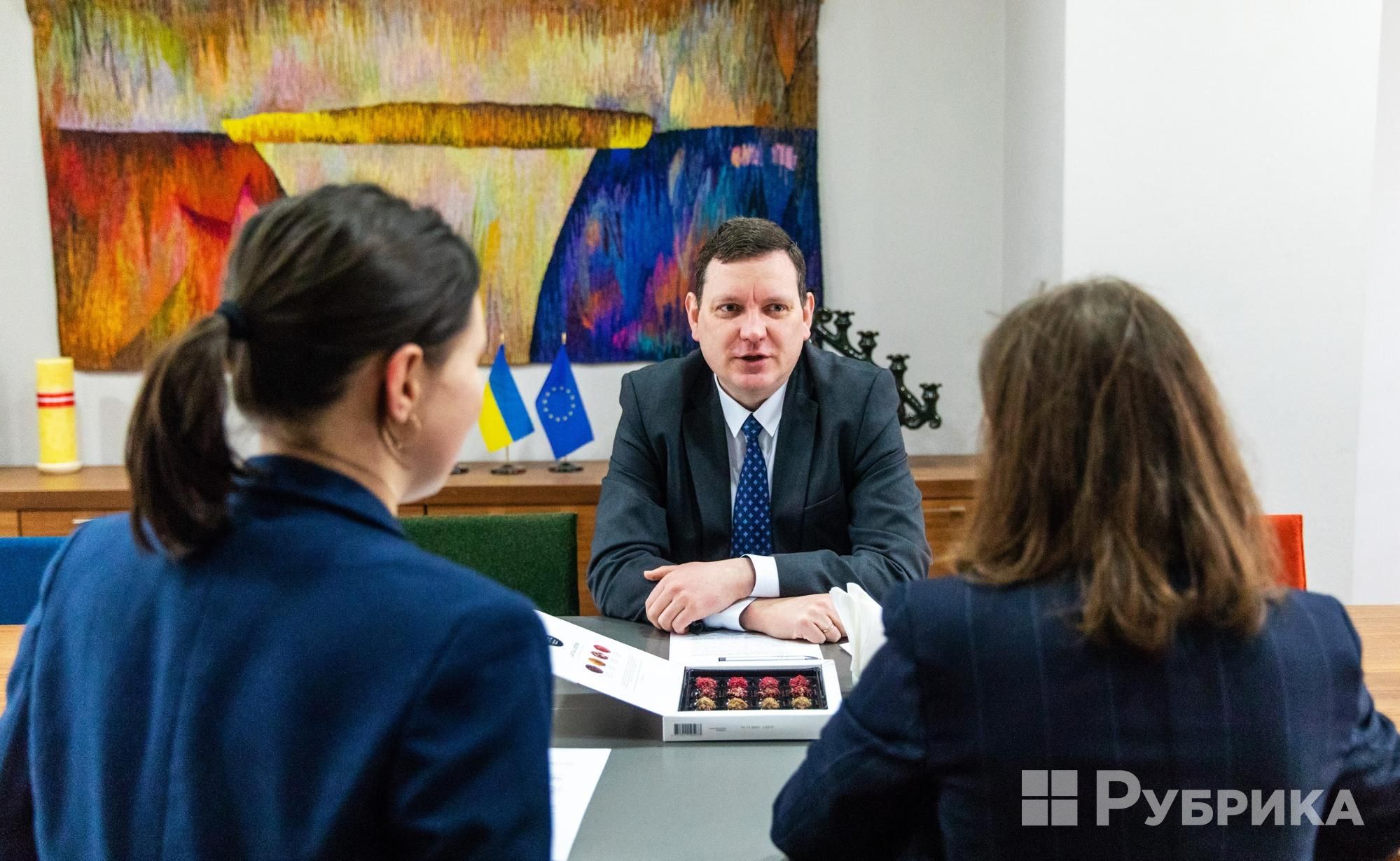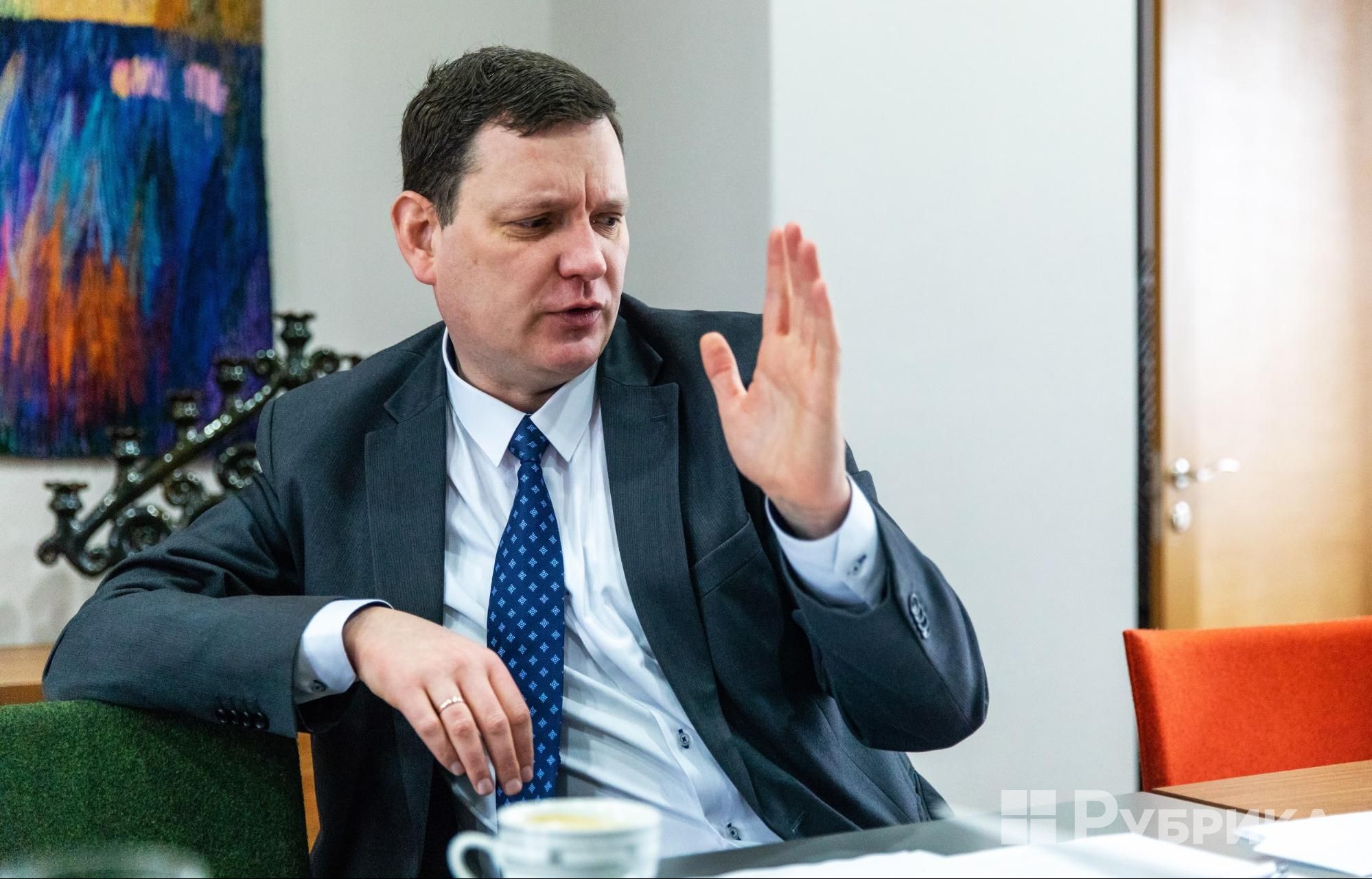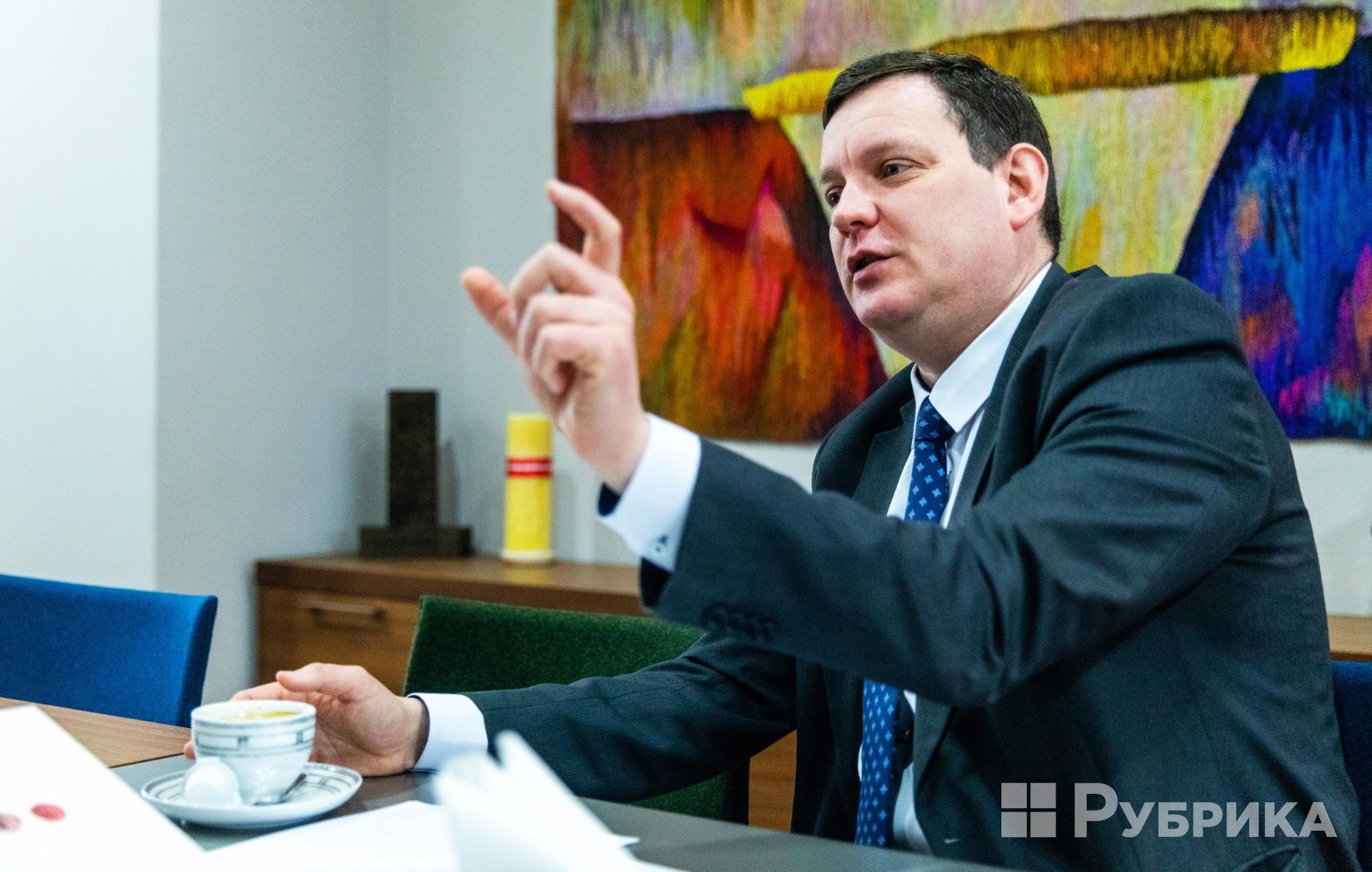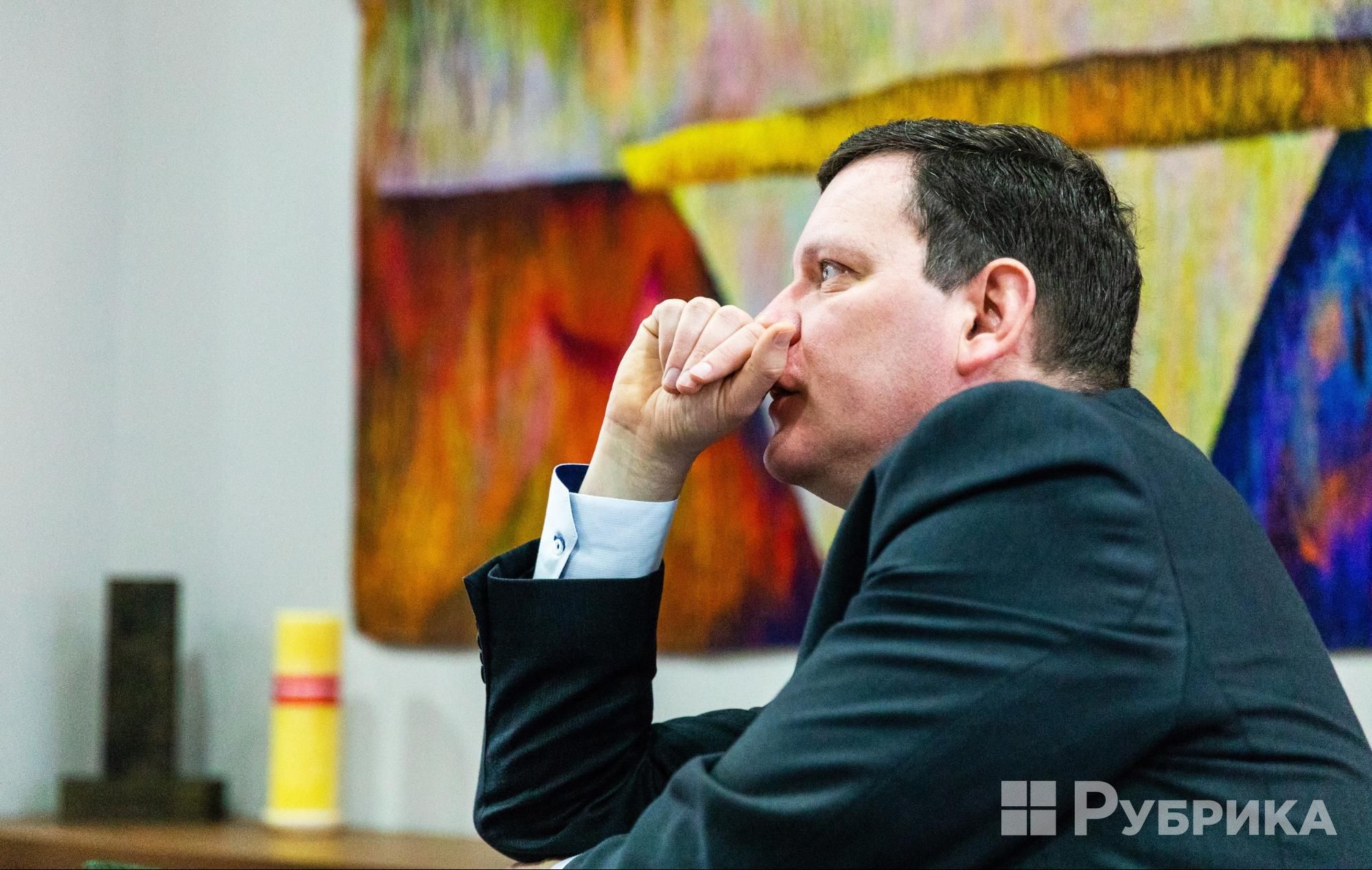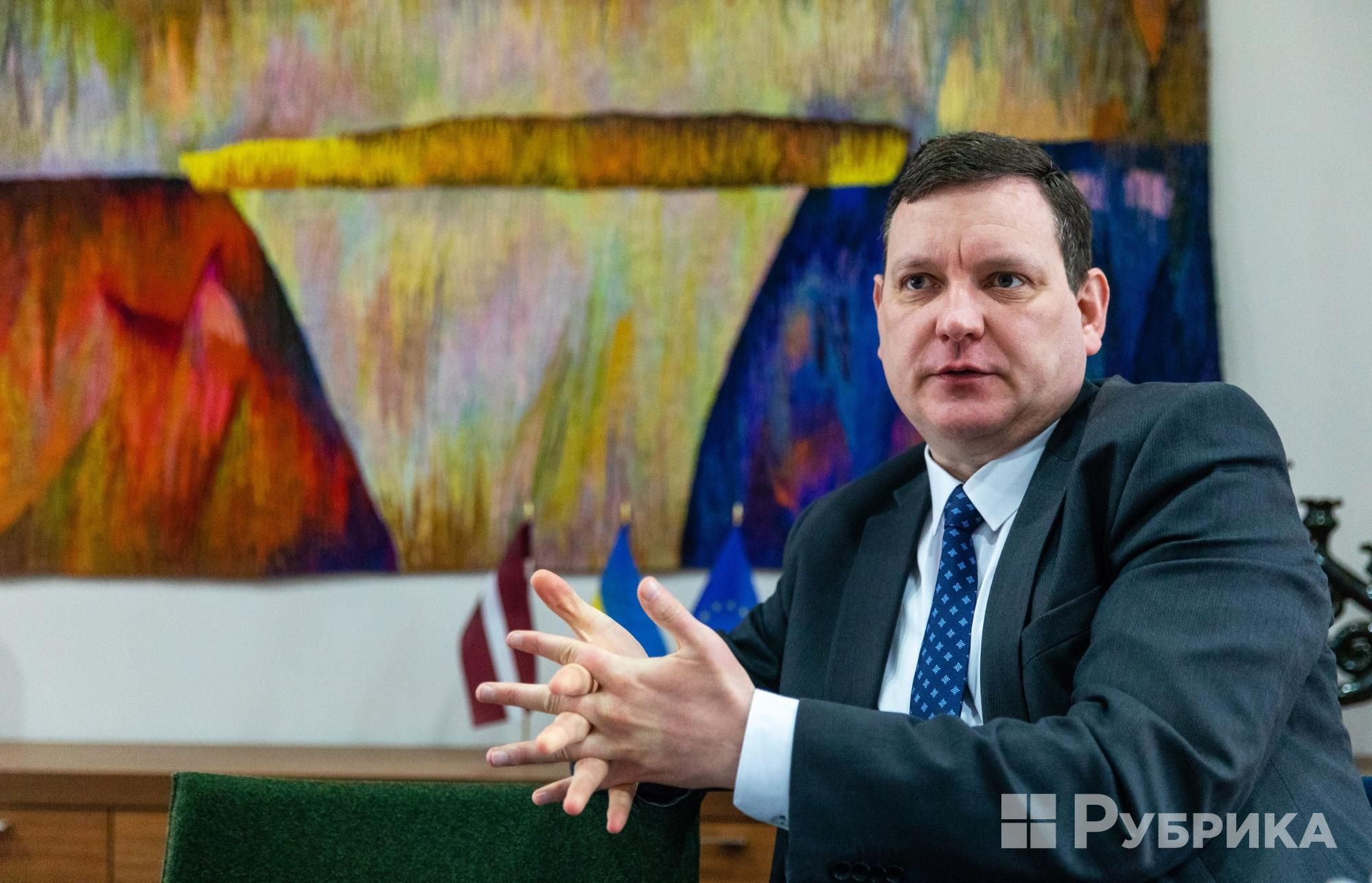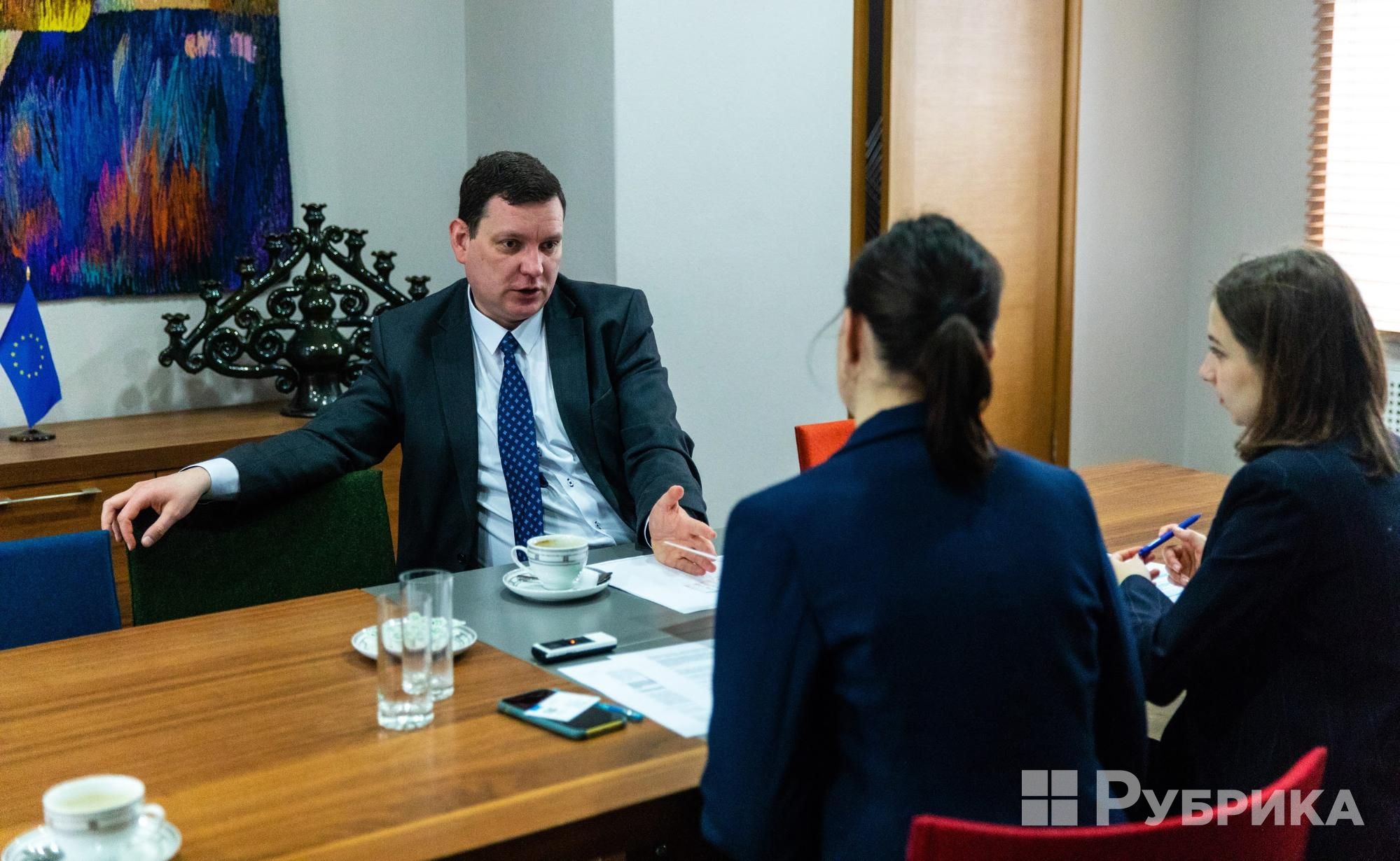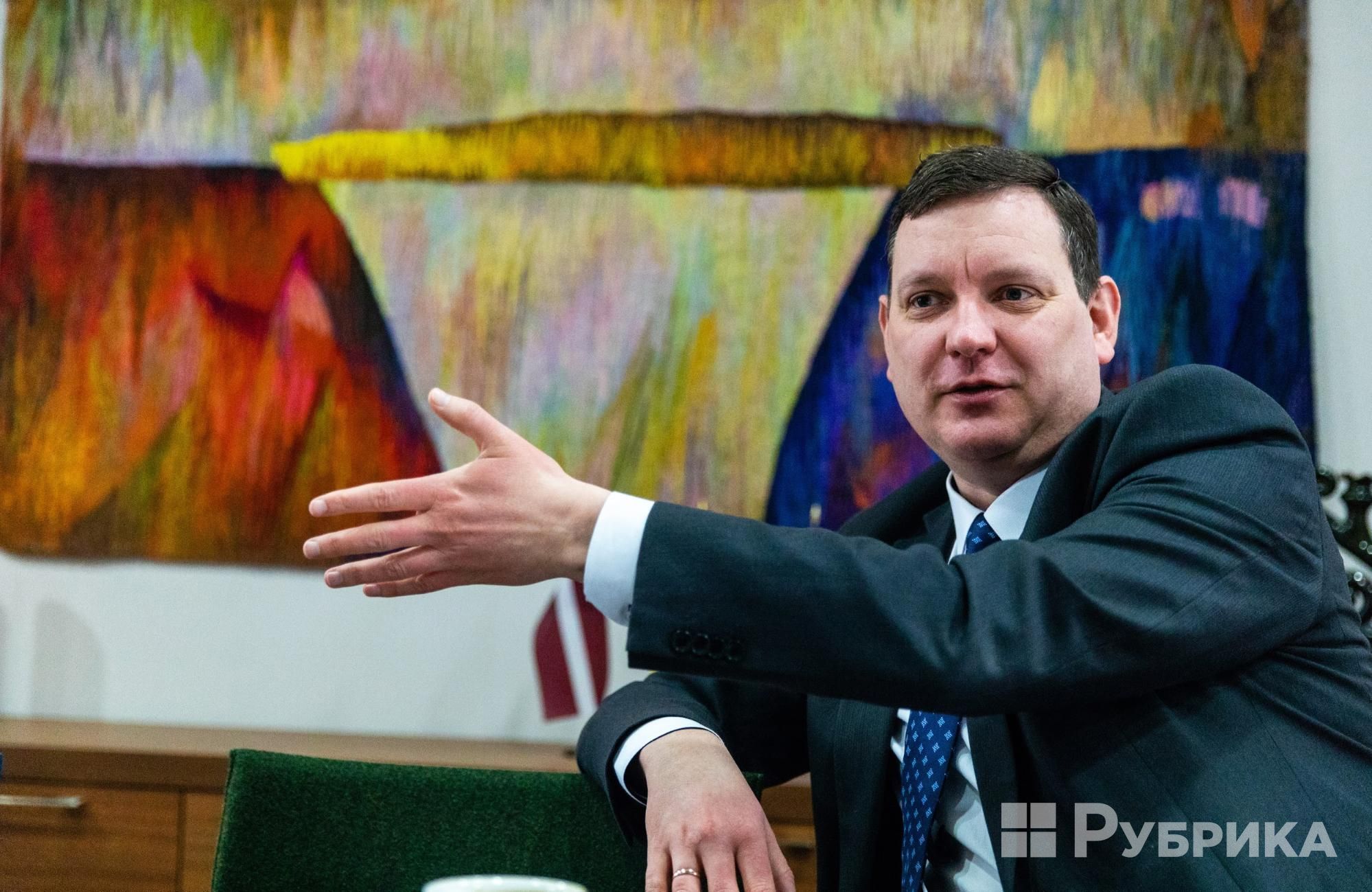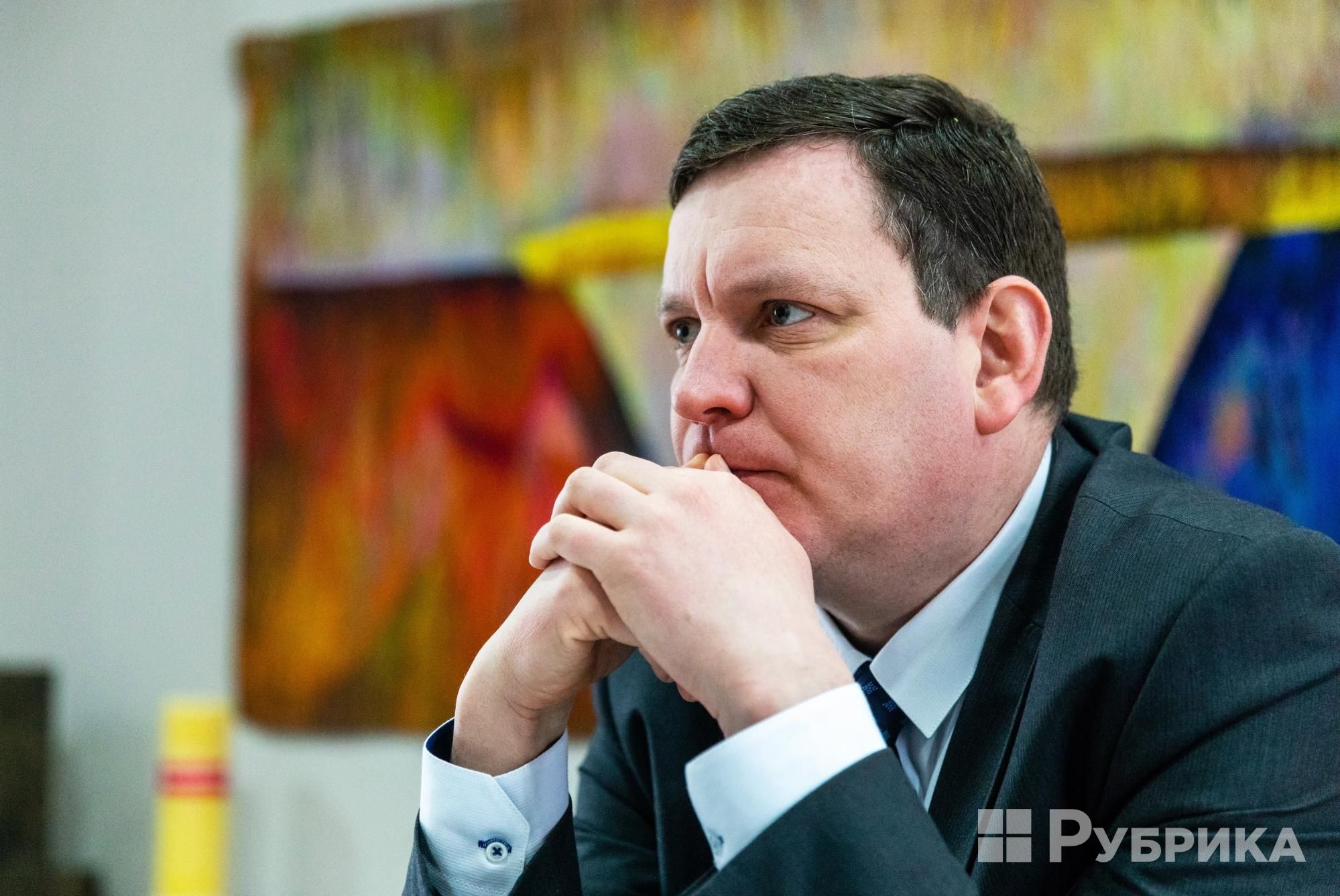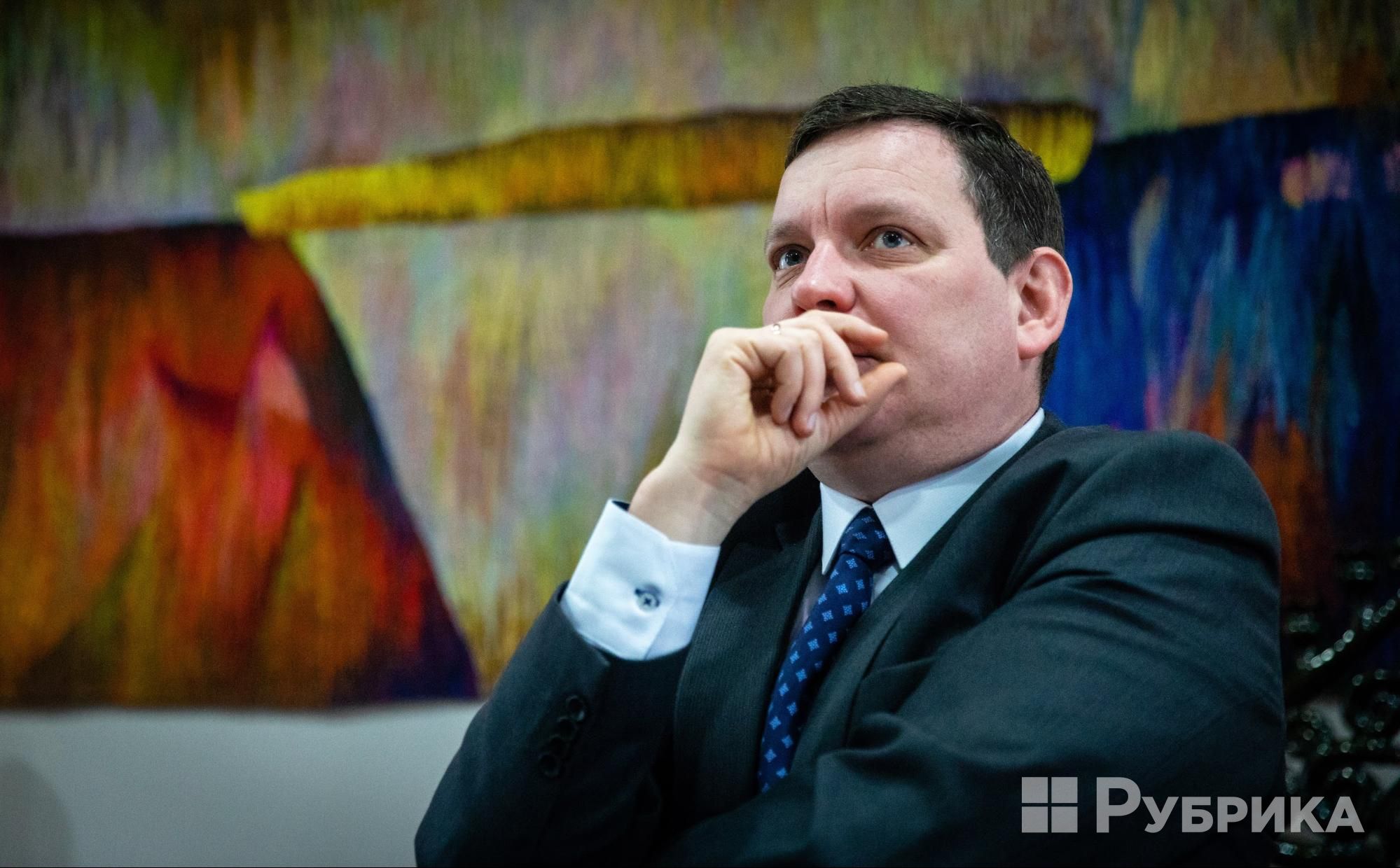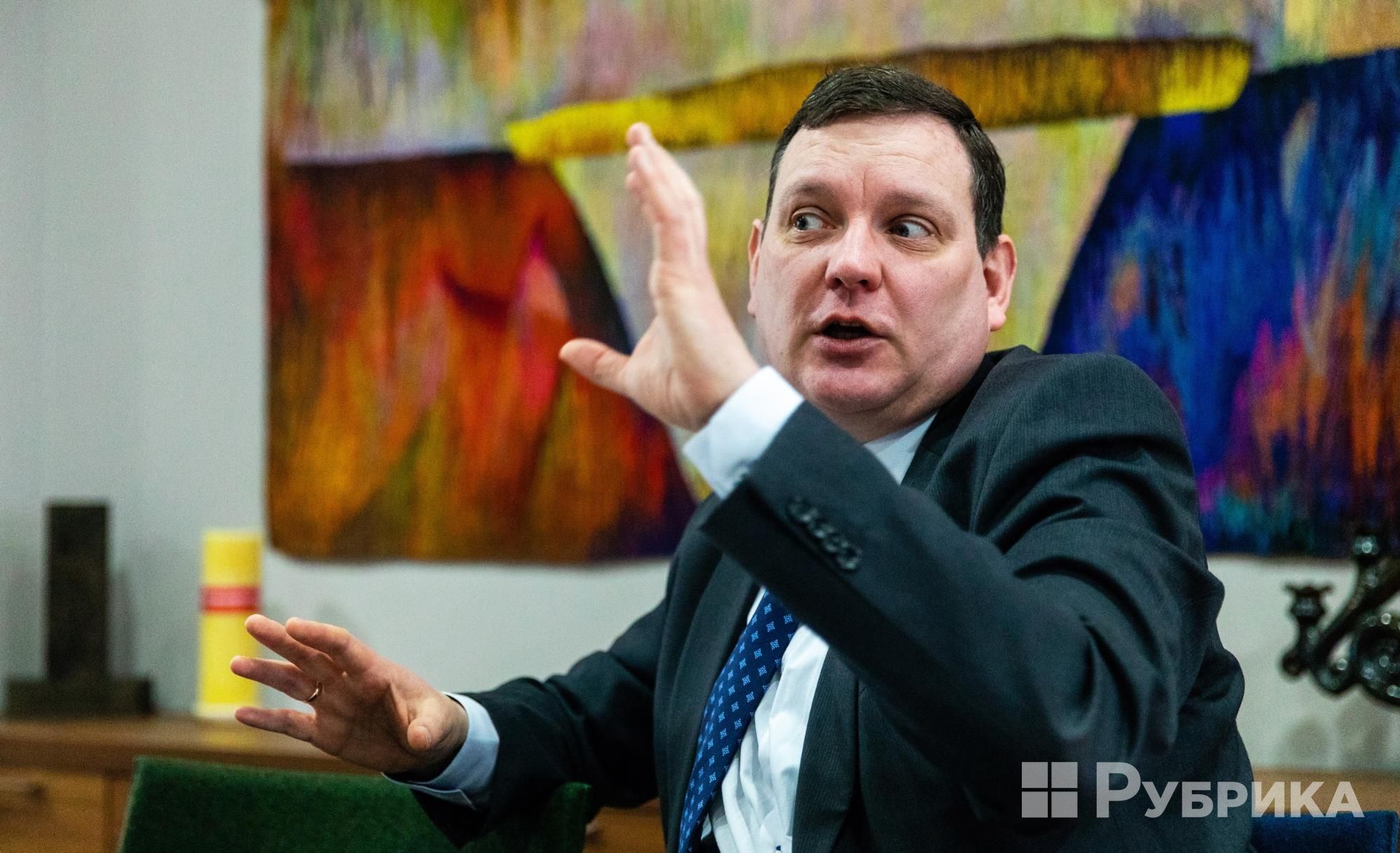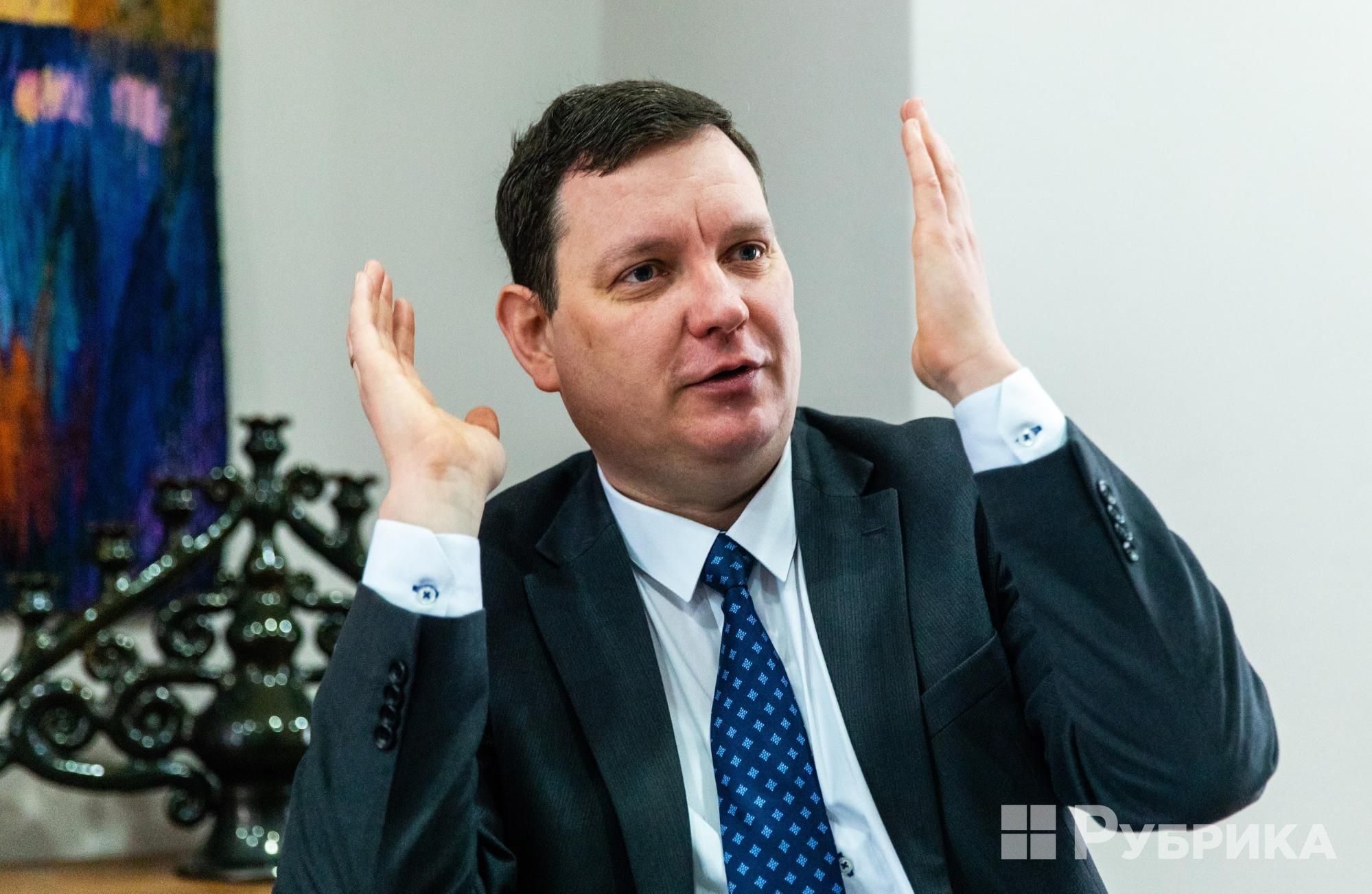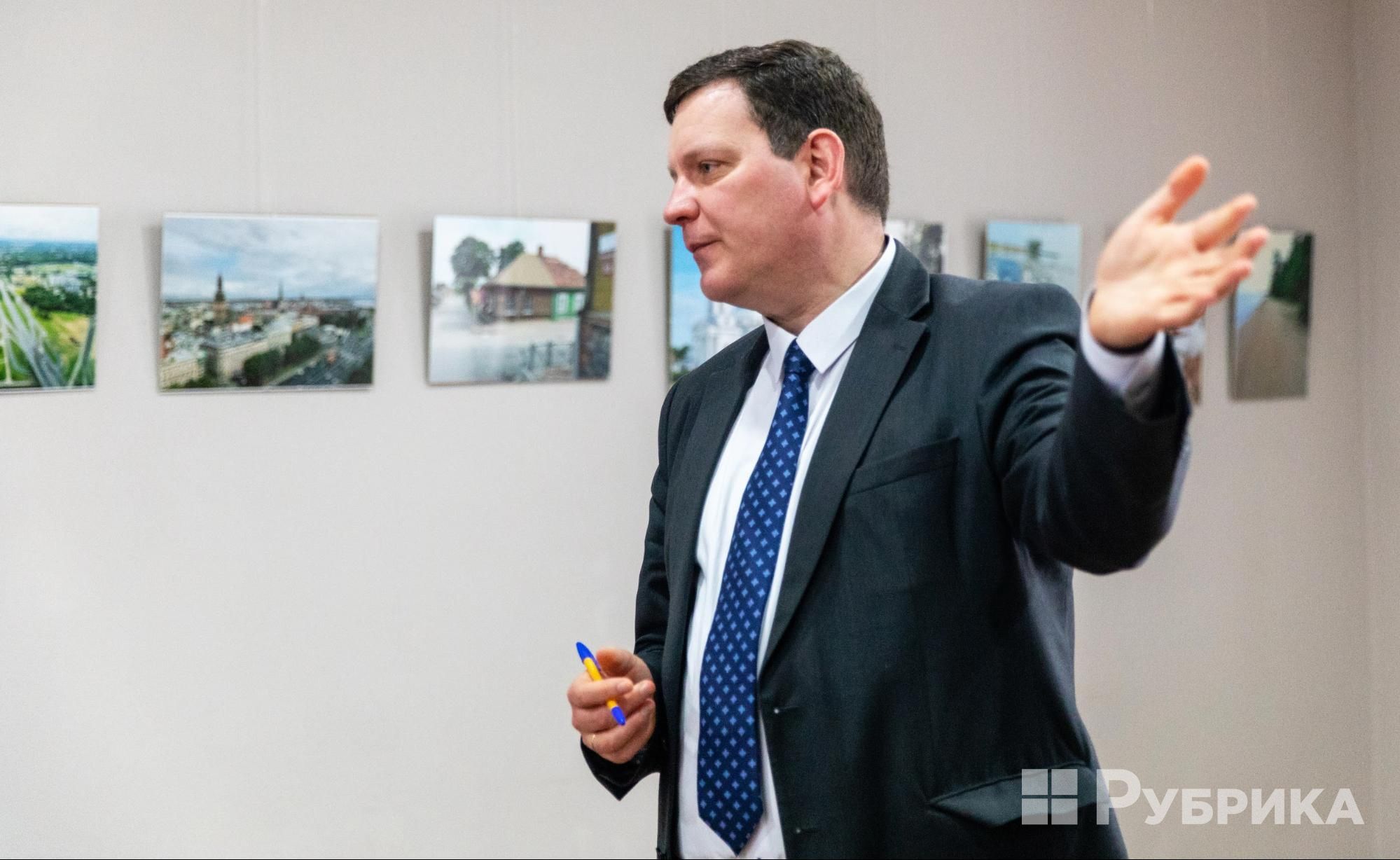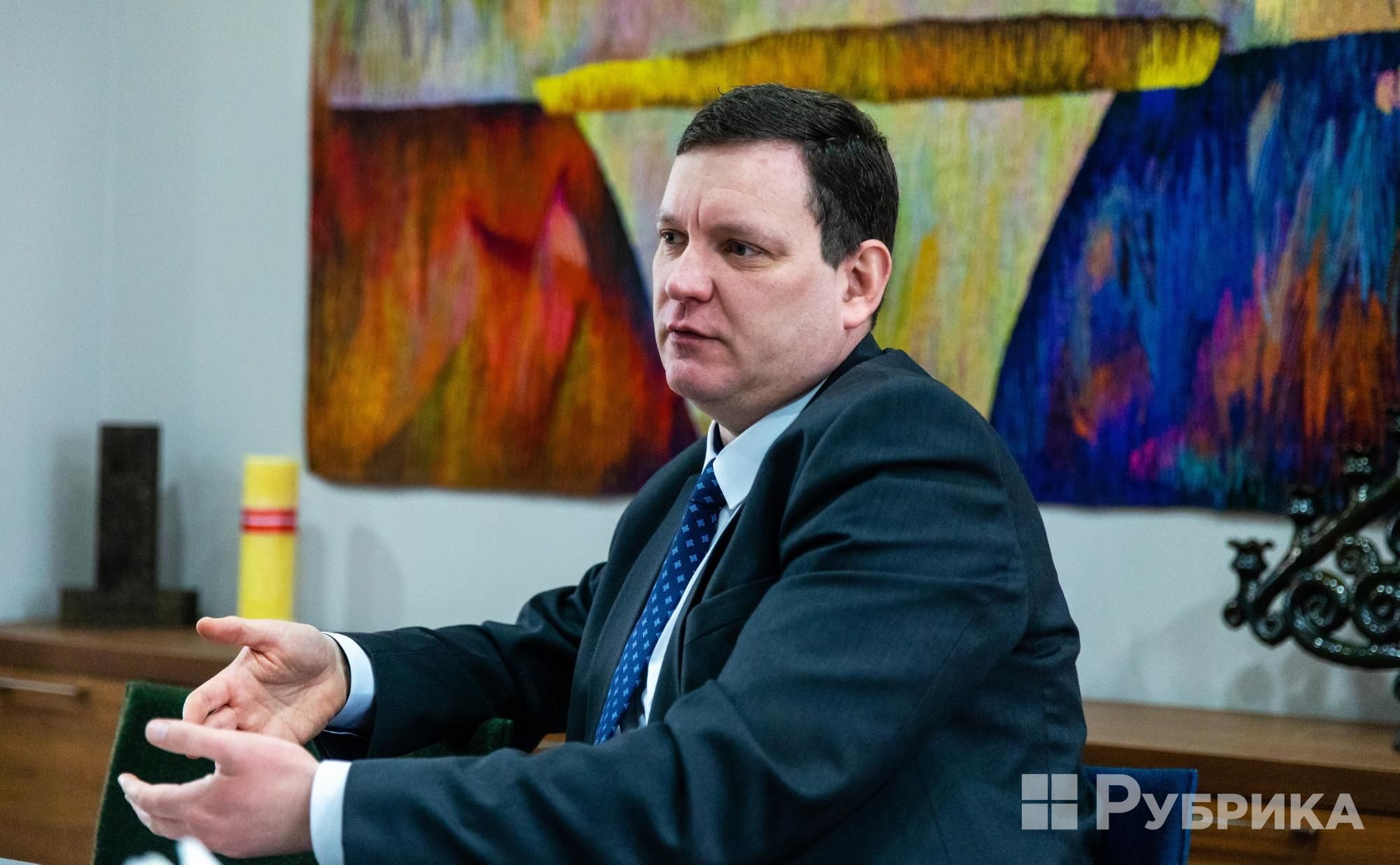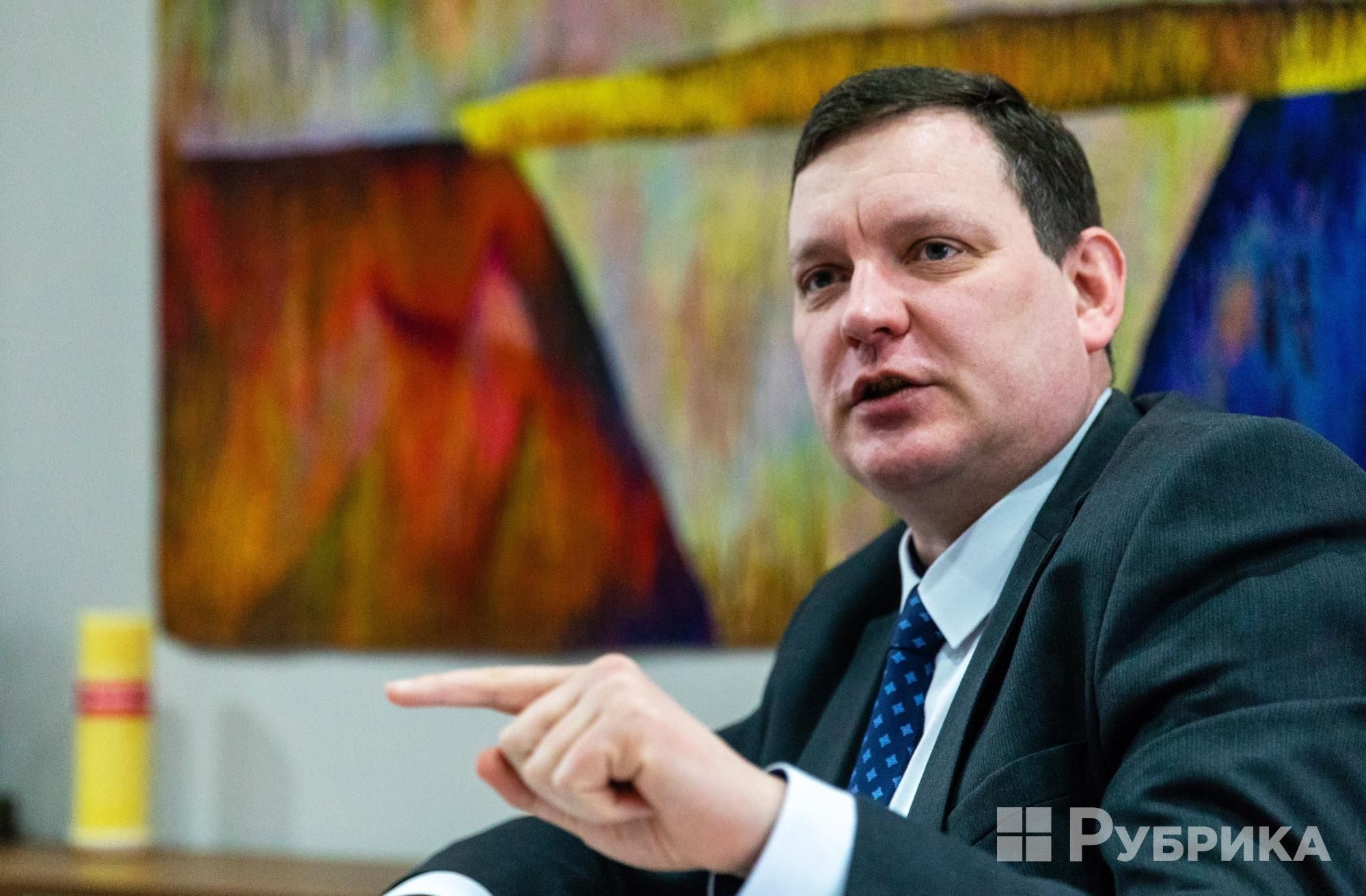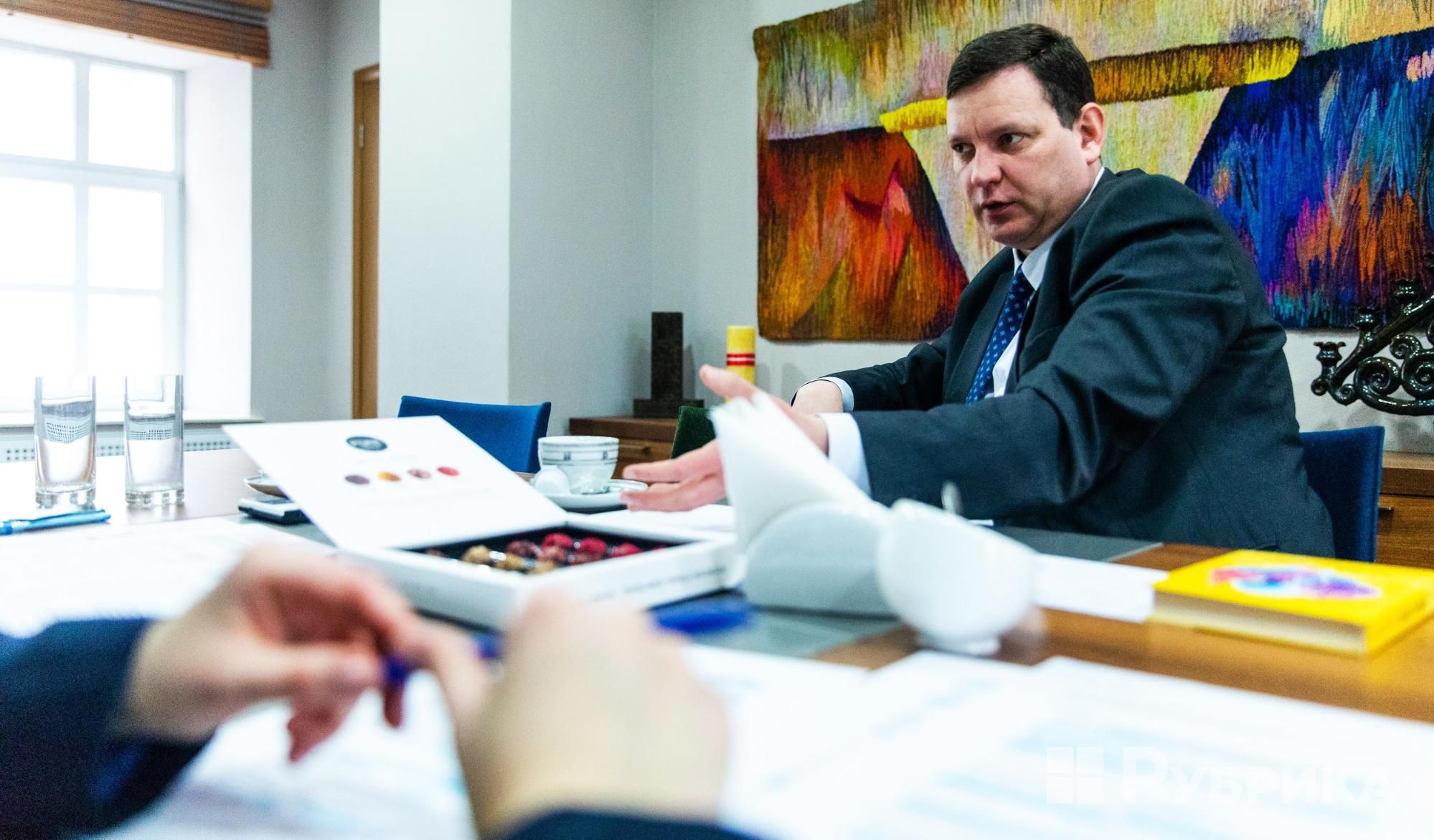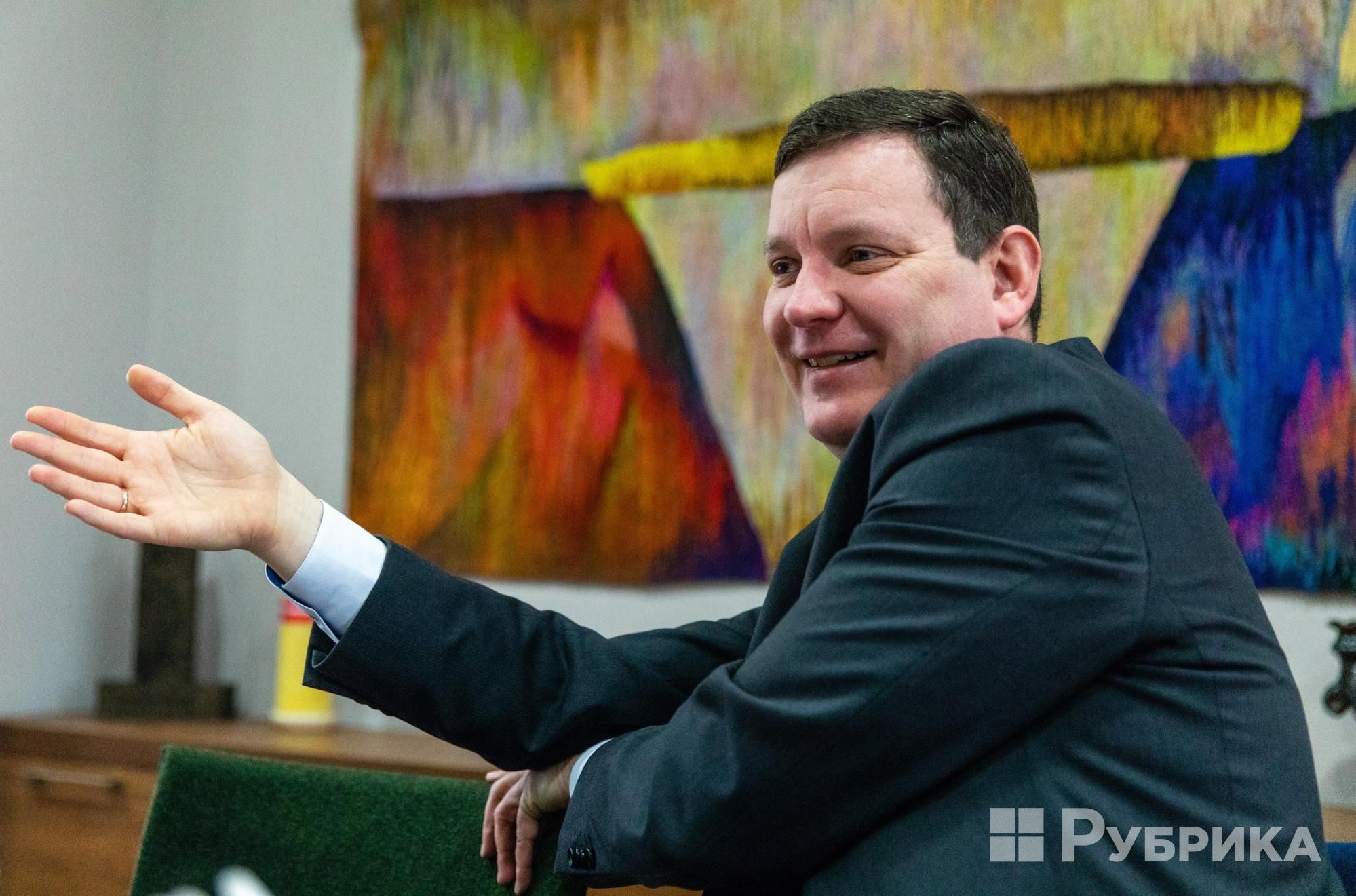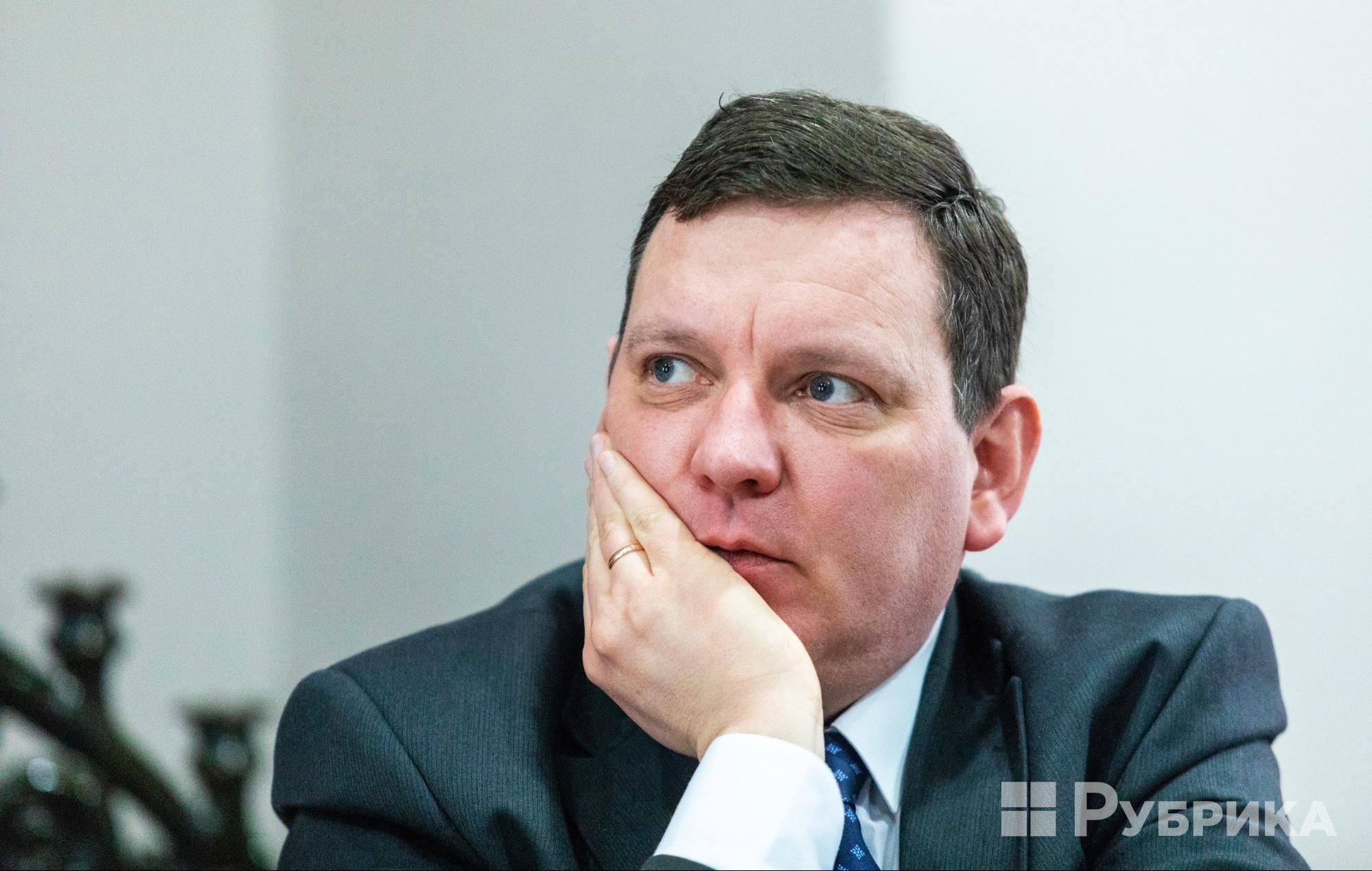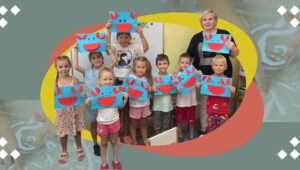"There are three most arduous tasks that Ukraine needs to solve simultaneously." Latvian Ambassador to Ukraine Juris Poikans on Ukrainian-Latvian realities
As part of the Diplomatic Note project, we talked with the Latvian Ambassador to Ukraine about relations between the countries, why the Ukrainian historical heritage is more complicated than the Latvian one, attitudes towards coronavirus vaccination, progress in Donbas, and what Latvians could learn from Ukrainians.
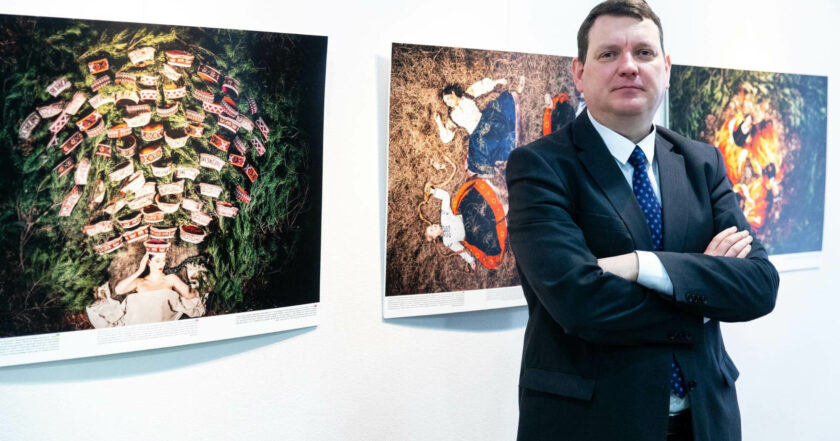
Juris Poikans has been living with his family in Ukraine for 5 years. It's a long time; a lot has changed during this time, and we're talking not only about carried-out reforms but also about the development of tourism, an international partnership between Ukrainian and Latvian cities, and even about stereotypes that, as the ambassador himself admitted to us, haunted him too. He's already become attached to many things, but many things also connected him with Ukraine even before his first visit here.
The connection between Ukraine and Latvia isn't so obvious, but it can be traced through the centuries. As it turned out, there's a trace of Latvians in many of our cities. It manifests itself in architecture, music, and even in the press; once, there were even newspapers in the Latvian language in Ukraine… Juris Poikans told us about this symbolic bridge, connecting Ukraine and Latvia, and about relations between the two countries at the Latvian Embassy, which Rubryka recently visited.
– You've been the Ambassador of Ukraine since 2015. Relations between Ukraine and Latvia are excellent, and you do a lot to maintain this friendship. Tell us what Ukraine did you see when you just arrived here as an ambassador? What's changed since then?
– There were certain stereotypes about Ukraine, of course. I'd been to Ukraine before–Lviv, Odesa–these aren't just geographical names on the map for me. I knew their history. I was in Kyiv both in 2013 and 2014. I recently looked through the photos and was surprised how many places I'd visited even before I became an ambassador. In general, Ukraine was a country both known and unknown. Of course, until 2015, it was still a period of active hostilities in Donbas, and when I arrived, I immediately noticed that there were many people in camouflage on the streets. There was a feeling of war. And the stereotype was me thinking there was no money left in the treasury after Yanukovych's escape. Now it may sound naïve, but then I thought: "Do they have shops?" When I drove here, I didn't know what to expect. Meanwhile, although there seemed to be a feeling of war, the cafes were full, the restaurants were full, people walked along Khreshchatyk, life went on.
I also noticed that in 2015, many people spoke Ukrainian. In recent years, this trend has been declining, but in 2020, you hear Ukrainian more and more often!
– Do you think Europeans still have such fears about Ukraine?
– Several negative factors affect Ukraine's image. The truce in Donbas is more or less preserved, but, as we've seen over the past few days, people are dying there. But the feeling of the approaching war is no longer there. I often visit Donbas and see how the infrastructure is improving there now. For instance, today you can get from Kyiv to Bakhmut with no problems. And in 2017, when I drove there for the first time, the road from Kharkiv to Izium was as if you were riding a roller coaster. I remember they showed me the destroyed building and said that it was Donetsk airport. I remember how we were sitting in Avdiivka, in the very center, and then Colonel Malykhin told me: "If the shelling comes from that side, the building can be destroyed in a few minutes"…
In the meantime, the feeling "Ukraine is a war" exists for many Europeans in the West now–it's first. Even in the Baltic states, when you say that you work in Ukraine, they don't understand that there's no war in Lviv or Kherson… And the second is Ukraine's image as a country where they don't fight corruption. It's a long-term issue that can't be removed from the agenda. It often happens that Ukraine's image, as shown in other countries, is untrue. So far, the situation is developing this way.
Quarantine and vaccination the Latvian way
– Let's talk about what everyone's concerned about right now–about coronavirus. A full year has passed since the start of the pandemic. How did Latvia deal with this crisis?
– There were two waves. We passed the first one with no problems; our incidence rate, compared with all countries, was very low. And then the second thunder struck, and it was apparent that pushing back into restrictions became even more difficult. People are tired of the government trying to tighten the screws. Imagine, hairdressing salons have started working in Latvia only since March 1! Knowing the Latvian mentality, I felt people would slack in autumn. In this sense, it's much easier to be in Ukraine now, because it's chosen a compromise path; covid is there, but many enterprises operate because businesses should live on. The difference is that the communication here is lively, and one feels that everyone's been ill with coronavirus.
Every government is experimenting. Many decisions are controversial, and it's the case in all EU countries; the level of government support has dropped dramatically.
– How successful is vaccination in Latvia?
– There were mistakes when purchasing vaccines: our government made a bet on AstraZeneca, which didn't come according to a predetermined plan. Then the logistical problems began. The plans to vaccinate everyone quickly weren't accomplished: about 4% of the population received the first vaccination, and only 1% got the second one. Unfortunately, we rank one of the last in the EU in terms of vaccination rates. I think we'll be able to make up for it during April.
Soon we'll face another problem; not everyone wants to be vaccinated, such an opinion circulates even among doctors. And many, especially those watching Russian television, believe that Sputnik is the best vaccine in the world. In this sense, we're faced with similar problems as Ukraine: mistrust of the government and vaccines. In Israel, this system worked effectively; it's not the case with us, because we have to fight certain prejudices, and logistically, we have problems almost every day. We plan to start active vaccinations in April, but experience shows that these plans may be delayed.
– What's Latvia's position regarding the Sputnik vaccine?
– The European Agency must register any vaccine that meets the criteria, be it Chinese or Korean. Until it's done, we don't even consider this issue theoretically.
In Europe, they discuss a vaccine certificate, and I think it'll indicate certain vaccines registered by the European Agency. If there's no "Sputnik" on the list, how may those citizens who've been vaccinated with it travel? Therefore, today our government isn't considering this issue.
– What about the AstraZeneca vaccine?
– Vaccination with it continues. We see that several countries have suspended its use, but we rely on our specialists' opinion. There are other vaccines, Pfizer, Moderna, but they're used in much smaller quantities.
We'll also insist on the priority of Ukraine's vaccination from the EU fund for third countries. Because we can't have one part of the world vaccinated and another one not vaccinated. But until these issues are resolved in several European countries, it'll be very difficult to imagine that assistance will be provided to other countries.
Why Ukraine is slowly reforming and when we'll join NATO and the EU
– Relations between Ukraine and Latvia today: what are they?
– I'd say our relationship is problem-free. On the one hand, we have no common borders. Unlike our western neighbors, our understanding of some historical events doesn't change; surely, when borders are redrawn, some part of our neighbor's land is always left behind. The Ambassador of Poland told me that most of the poets and writers studied in Polish schools weren't born on the territory of modern Poland.
We, Ukraine, the Baltic countries, and Belarus, are at the intersection of interests of East and West, and it's one of our biggest challenges. On our territory, there was a war between the Russian Empire and Sweden; the Swedes were ousted, and then we became part of the Tsarist Empire. From the West, we had a strong German influence, and you had a strong Polish influence. That is, the last century of our relations was very difficult: countries were created, like the Ukrainian People's Republic, the Republic of Latvia. The UPR was destroyed, the Republic of Latvia was destroyed in 1940. The countries changed, but the geography remained the same. That is, on the one hand, we're dealing with Russia, a country that lives with a very strong post-imperial feeling. On the other hand, we need to preserve the way of life. Then we can develop as independent countries.
We also understand the challenge the east of Ukraine is facing is the objective foundation of our cooperation. Unfortunately, the tragedy with Crimea brought our countries closer together. The occupation and subsequent annexation was such a flagrant violation of international law that for us, restoring the territorial integrity of Ukraine is a matter of principle. We'll take an active part in creating the Crimean Platform; our president has confirmed his participation. It's a stable foundation for our relationship.
If we talk about bilateral relations, then it's the field of trade. Last year was a record year: the volume reached 400 million euros! Starting from 2013 and 2014, the trade turnover has grown by about 2.5 times.
Political, parliamentary, economic, educational–all these ties are developing, alongside this political foundation, based on international law. For us and you, we must develop as independent states. And it's, objectively, our common interest. It's apparent that it's easier for us, but that's another matter.
– We know that on March 2, the ambassadors of the Nordic and Baltic countries discussed land, anti-corruption, and decentralization reforms with Razumkov. In your opinion, how successful are these reforms? What can be improved?
– The historical heritage that Ukraine received in 1991 was much more complex than the historical heritage of Latvia. For example, we were part of the USSR for 50 years, and for you, it was longer. I'm not even talking about the Holodomor, an enormous tragedy for the people when they tried to break the back of the Ukrainian peasantry. I always say: you can't believe that with a new president arriving in Ukraine, it'll be possible to solve everything that we couldn't solve for not 10, not 20, and maybe even 70-80 years. The Baltic states were in a polar position, for instance, we had a clear concept of the nation-state in Latvia. We understood we had lost our independence, and we knew we could strengthen it through the EU and NATO. In Ukraine, everything is more complicated, people are very different: there are Russian-speaking Ukrainians and Ukrainian-speaking people, there's a Western Ukrainian and an Eastern Ukrainian. Now, of course, these differences have diminished, but they persist.
In my opinion, reforms in Ukraine will proceed much more slowly than in our country. We can't imagine that the Latvian oligarchs control the media, for instance. Probably the most important thing is to take the first steps. They were postponed for a long time. It's clear that the land reform has now been adopted, but you must adopt acts and laws. The key thing is for the land market to work.
But the most important issue is the judicial system reform because, if there's no 100% guarantee of preserving foreign investments, then foreign investors won't come here. I'm glad that the Ukrainian government is talking about these investment projects. But if they enter, how will investment nannies help if investors are "teased"? Therefore, today the most crucial matter is to give a sense of justice in Ukrainian courts. It's necessary, both internally and externally.
Second, we're returning to Ukraine's image; it's very beneficial for Ukraine's ill-wishers to raise and exaggerate these issues. I see the three most arduous tasks Ukraine needs to solve simultaneously. The first is to end the war, but that doesn't just depend on your wanting it. Second, it's necessary to complete the reform process. The third is to build a national state uniting Ukrainians under a common national idea. It's hard, but it's an issue you can't forget, because every Ukrainian, whether he/she lives in Mariupol or Uzhhorod, should feel like being in a big family.
I feel that the country is moving in the right direction. Mr. Razumkov manages the Parliament skillfully, as we can see. He has created good relations with almost all political factions. It's also very important. Of course, everyone wants the changes to be faster, but I always tell my Western colleagues that it won't work faster. They often ask me why it worked out in Latvia, but not in Ukraine? And I answer that it's impossible to compare us. There are 40 million people in Ukraine, and we have only 2. We've had a statehood, and in Ukraine, it's been only for a short period. These are different countries with different historical understanding and mentality. Therefore, the process is slower in Ukraine.
– You mentioned your Western partners, and the question of NATO wants to pop up. Zelenskyi recently asked a faery question to Biden: "Why are we not in NATO yet?" Why, do you think, is that?
– Ukraine isn't in NATO, because there's no political decision on Ukraine's admission to NATO. After all, Ukraine, as a country, hadn't decided on its geopolitical priorities until 2014. It's the first question, and the second is the reform of the Armed Forces of Ukraine. That is, how well and seamlessly the Ukrainian armed forces can cooperate with the NATO armed forces. It's also civilian control of the military.
Today it's a little too soon to say that Ukraine will join NATO, but it doesn't mean that we can never talk about it. Reforms are happening in Ukraine: in recent years, the army has become combat-ready, and one of the ten most powerful armies in Europe; there's a reform in the Ministry of Defense. I agree with what Estonian Ambassador Kaimo Kuusk said in his interview: today you must do everything to keep your political decision, having carried out all the reforms and coming in compliance with all the criteria. It's like doing your homework at school and then waiting to be transferred to the next grade. It's painstaking work that will have a result.
NATO is even connected to the judicial system reform, the same applies to the EU. I wouldn't despair. It seems there's no prospect, but it's there. In your case, there's a partnership with NATO, an association agreement with the EU; the most important task is to implement these agreements. After that, you'll ask for further cooperation, and we'll support you. It's like discussing "pay for play."
In all respects, Ukraine is a European country. For example, we can discuss Turkey long, but there are no doubts about Ukraine.
Donbas development paths
– You've been to Donbas many times and even planned to open a consulate in Sloviansk. Why is this process delayed?
– These are bureaucratic issues they must resolve on the other side. The issues are being resolved with the support of Oleksandr Pavenko, a local candidate (Oleksandr Pavenko, a pastor, a volunteer from Sloviansk. Since 2014, he's been assisting families of internally displaced persons and other people affected by the conflict in Sloviansk. His two sons were killed by militants in 2014 when the city was occupied – ed.). Opening the consulate will happen, and, of course, we attach great importance to this, because we need a person coordinating cooperation with the East. In recent years, our cooperation has been strong.
We started with humanitarian aid, and, to be honest, we're tired of it. Many years have passed. I've already said that when you walk along the streets of Kramatorsk and Sloviansk, there's no feeling that something is collapsing there. Therefore, it's significant for us to provide other ways of cooperation and development for Donbas. Over the years, we've concluded two town twinning agreements. The city of Ogre to the east of Riga has concluded an agreement with the Popasna territorial community; it's very close to the war zone and line of contact. Then, the city of Saldus in the west of Latvia concluded an agreement with Bakhmut. For Bakhmut, it was the first twin city. And we're looking at these relations in a bilateral direction. It's cool that they weren't afraid to go so far to the places where not all Ukrainians have been to, and that they reached this level of town twinning. We don't end with this: for example, we recently held talks in Kramatorsk.
A separate article is a relationship between universities. A graduate of the Latvian University works in the Kramatorsk Engineering Academy. They already have two cooperation agreements. I also visited the Donbas Democratic Academy in Sloviansk.
We want to bring Donbas to international cooperation so that people don't live with military hundreds and humanitarian aid. I understand that they also want human communication. In the summer, we handed over the system for surgeries to the Sloviansk district hospital. It's important to give Donbas residents the feeling that they're not alone, and we can't do this with humanitarian aid alone. Therefore, we want to go to other levels, and creating an honorary consulate will immediately bring a connection with the local administration, business, and so on. This question isn't implemented, but everything works much slower because of covid. I hope it'll be done during this year.
What Ukrainians learn from Latvians and vice versa
– Tell us a little more about the twinning relationship between cities. What are they like?
– They're different for each city and depend on how much the local government is interested in cooperation. For instance, the city of Ogre has two twin cities in Ukraine: Popasnianska territorial community and Chernihiv. Latvians came from Ogre and took their children for rehabilitation, and at the end of last year, the mayor of Ogre organized a live business forum for Chernihiv and Luhansk entrepreneurs.
– How far can you go in town twinning?
– Everything depends on mutual interest. Certain topics interest all Ukrainian municipalities, for instance, waste recycling. So, recently we were in Drohobych and now we're thinking that the Latvian company will enter Drohobych; they'll create a waste processing enterprise, and we'll try to apply this model to other cities. There are many topics. Twinning is a living organism, and the capitals must cooperate as well. In recent years, cooperation has come to ought a little; however, there's a new dynamic mayor, and, I think, we'll consider his visit to Kyiv.
Twinning also means humanitarian aid and cooperation in education. Sometimes we bring together Latvian and Ukrainian schools and hold videoconferences. It's an ongoing living process. Everything depends on whether both sides will want to cooperate.
Don't expect big political accomplishments. The most important thing is that they learn something from each other, see how energy efficiency, waste collection, water supply work in actual life, and you don't need embassies. Let them cooperate. These connections exist for communication.
– Waste collection, energy efficiency solutions–it's what Ukraine could adopt from Latvia. What experience could Latvia learn from Ukraine?
– I liked how the city is greening in Bakhmut. I really like Kharkiv; it seems to be one of the most well-groomed cities in Ukraine. Everything related to public transport. Latvia has its advantages: first, it's funding from the EU, and it's apparent that Latvian self-administrations are richer than Ukrainian ones. But, for instance, in the city of Dobroslav on the border of Odesa and Mykolaiv regions, there are many theme parks created by ethnic minorities; there are a lot of them. And it happened in conditions of limited funding.
Here's Lviv, a city comparable to Riga. When you walk around Lviv center, you feel that there are more tourists in the main square than in Riga. Tourism is developing there at a terrifying ー in a positive sense ー pace. Cafe after cafe, restaurant after restaurant. And the fact that Lviv brands are tapping into Kyiv suggests that someone was thinking about the city's image. Therefore, Riga would be interested to see how the local economy is organized.
Latvians in Ukraine, investing in economy and tourism
– How many Latvians live in Ukraine now? Is there an established diaspora?
– We can't give an exact figure, but there's a community. There's a Ukrainian-Latvian society headed by Oleksandr Babushkin. During the Soviet era, Latvians quickly became Ukrainized or Russified. There are about 30 of us attending events; very few of them are elderly. Today the basis of the Latvian community is made up of people who either got married–Latvians who have Ukrainian wives–or people who work in Ukrainian organizations, several dozen people. Mostly, Latvians migrate to Western countries. When the parliamentary elections were held in Latvia in 2018, 82 people came to the polling station in Ukraine, including those voting within the embassy. It's little, but there's someone.
There are few Latvians in Ukraine, especially children, and we can't compare this with other communities. We tried to organize movie days, but too few people attended. We can gather Latvians for sporting events, then about 20-25 people come, mostly men. Sometimes we organize holidays, but a constant presence isn't enough. For the 100th anniversary of Latvia's independence, we created a dance group: 8 couples who took part in the festival "Songs and Dances of Latvia," but unfortunately, it fell apart, because the group's main "ideologist" left for Indonesia.
Historically, there were 15 thousand Latvians in Kharkiv after the First World War. They migrated to Ukraine when the Kaiser's troops approached Latvia. There were even 2 newspapers in the Latvian language in Kharkiv. Oddly enough, this city is most connected with Latvia, thanks to the Kharkiv University, where the father of today's modern Latvian language studied. There is also an architect Caune, about whom we know almost nothing in Latvia. He left several dozen houses in Kharkiv, and didn't return to independent Latvia, but remained faithful to the city. There are well-known musicians in Latvia, the Jurjāns brothers, who have lived there for several decades and organized musical life there. When I went to Karazin University, I saw that there are a lot of living contacts, but we've lost them.
– Foreigners are increasingly coming to Ukraine to invest. You've already mentioned the importance of foreign investment, too. To what extent is Latvia interested in investing in Ukraine, and in what fields?
– Everyone is interested in IT. We had a cool forum with Kharkiv IT specialists. When I was in Lviv, we agreed with Sadovyi's deputy about an IT forum with Lviv residents. And we always invite Ukrainian IT specialists to our events.
The largest investment in Ukraine today is the Malokakhovskyi stone quarry, one of the largest taxpayers in Kremenchuk. There's interest in entering the Ukrainian market; there was Riga-Khlib in Chernihiv, an enterprise initially with Latvian capital, but now, as far as I know, it's passed into the hands of Ukrainian entrepreneurs.
If the land market starts working, I see our business's certain interest. Of course, it doesn't entail selling land to foreigners, but some form of cooperation is possible.
The biggest problem in investment is the lack of a stable guarantee of property rights. Today, the development of trade and economic ties is more promising. In any Ukrainian supermarket, you'll see Latvian sprats, alcoholic beverages, ketchup, sweets. And in the Latvian store, you'll find Ukrainian ketchup and tomato juice, sunflower oil, watermelons, wine, and vodka products. There's a mutual interest. About a year ago, a Latvian interior design store was opened in Kyiv…
In 2020, Ukraine entered the TOP-20 trade and economic partners. I tell entrepreneurs in all cities that we're interested in Ukrainian goods. A lot of "honey people" come to me, after all, honey is your national product. We also propose to establish joint ventures between Latvians and Ukrainians; such cooperation would help Ukrainian producers enter our markets. The Investment and Development Agency shows Ukraine is on the right track and we're interested in working with Ukrainian business.
– By the way, speaking of the relations between Latvians and Ukrainians, AirBaltic has resumed flights from Ukraine to Latvia. The first Kyiv-Riga flight is scheduled for March 17. Since the beginning of visa-free travel with the EU, Latvia remains one of the major tourist destinations for Ukraine. How important is tourism for Latvia?
– We had 3 flights a day between Kyiv and Riga. They had 6, and now have 3, but in one day! And their occupancy rate was close to 100%. Riga-Lviv occupancy was about 90%, and we're interested in restoring it. We also plan to resume air traffic with Odesa. I also want to open-air communication with the East of Ukraine, and it doesn't matter if it's Kharkiv, Dnipro, or Zaporizhzhia.
In terms of the number of Ukrainian tourists in Latvia, you ranked 13th after the visa regime was canceled. Last year, during a visit, Razumkov and I walked around old Riga, and tourists from Zaporizhzhia approached us and asked when our legendary bridge would finally be completed. One immediately feels that there are Ukrainian tourists in Riga!
We're trying to develop tourism and believe that Latvia can be interesting to Ukraine as some kind of nostalgia. Last year, Razumov and I walked around the old town in Riga, it might've been his first visit to Latvia, and I showed him the places where the Sherlock Holmes series was filmed, the cafe where Stierlitz was sitting…
Relations with Russia and the "Russian world"
– Recently, we've stopped broadcasting famous Russian TV channels; Latvia also regularly does this. But we know that you tend to stop not forever, but for six months. This time 16 channels were blocked for a year. How does it work? What will happen in a year and how effective is it?
– Russians will never agree with me, but we're not looking for political reasons to close Russian TV channels. We understand very well how the Russian propaganda machine works; very often their messages about Ukraine are in no way positive towards our countries. We want to give any Latvian viewer the opportunity to analyze the events themselves. When I met with the Minister of Culture Tkachenko, I said that it was essential that these packages included at least one Ukrainian channel. After all, the languages aren't so different that they wouldn't understand them. There are your TV shows. It's a great product, with good content. Therefore, I'm glad that the Latvian viewer has the opportunity to watch, for example, 1+1 and UA TV. Let the person who watched Solovyov and Kiselev watch your TV channels, and then, perhaps, watch Dozhd. The most important thing is to allow choosing what to watch. However, first, there are a lot of signals coming from Russian television that borders on ethnic animosity, where they flip facts. Second, we can't take and capture channels, because very often they're registered in other EU countries. As for these 16 channels, their copyright holder changed, and we couldn't identify the legal entity that possesses these rights, so we simply stopped the work of these TV channels. Russia will always see political reasons here, but Latvia as an EU country is looking for legal arguments.
What comes from Russian TV channels cannot be called friendly towards our countries.
– How does Latvia fight the Russian world?
– In the early 90s, we set the task of creating a society based on an understanding of general state development issues. I think we can never achieve this result. Both in Ukraine, and Latvia and even in Georgia, any country associated with the Russian Empire or the USSR, there'll always be a part of people guided by the views and opinions of Moscow. And in this sense, the only question we have is how effectively we can integrate ethnic minorities into our society. We're working on this a lot.
It's hard to integrate a minor part of something very large. I don't see any problems in daily life. Every third marriage in Latvia is interethnic. Actually, there are 2% of Ukrainians in Latvia, and they have very different views on the situation in Ukraine. There are both patriotic and pro-Soviet people. Also in Latvia, there are 4% of Belarusians, 2% of Poles, 2% of Lithuanians; they all speak different languages. There are Ukrainian and Polish schools funded by the state. It is crucial that ethnic minorities feel like they're part of people. Therefore, Ukrainians always gather near the Shevchenko monument in Riga when political leaders come.
There'll always be a part of people who'll look at Russia or Moscow with enthusiasm, but it's important for us that they feel comfortable. We restored our independence in 1991, and part of the representatives of ethnic minorities didn't support this, because many of them arrived after 1940, and they knew nothing about what had happened before and didn't receive citizenship. But even in the toughest years–1988-89–we had no political enmity. Besides, the Russians living in Latvia, Ukraine, or Uzbekistan are different. They adopt national qualities from peoples they live among. It's clear that those Russians living with us have lived here for more than one generation; many of them, especially young people, speak Latvian. We look at historical events differently, especially the period from 1940 to 1991… But we must put this aside and live in the future.
Events in Crimea are also perceived differently in Latvian society. It's a more complex issue about Russia's future, but it's a pity that Russia has now relied on the post-imperial syndrome, resulting in Crimea and Donbas.
– In Latvia, there is a category of population, "non-citizens." (It's a special legal status granted by the Republic of Latvia to former citizens of the USSR residing in Latvia as of July 1, 1992, and not having citizenship of other states). Since 2020, it was decided not to assign this status to newborns. However, this category remains. How does this affect the political climate in the country?
– The status of a non-citizen is preserved, but in general, any person today can take an exam for citizenship. By the way, there are a lot of them: several hundred thousand. But there's part of the population who believes that citizenship should be granted automatically. Another part is satisfied with the status of a non-citizen. I spoke with one Russian, who has the status of a non-citizen, he told me: "If I now obtain Latvian citizenship, I'll immediately have a visa regime with Russia," but he doesn't want to stand in line for a visa in the Russian embassy. That is, he can go to the European Union and Vladivostok with no visa.
In this situation, everyone has their arguments. To get citizenship, you can take an exam, it's simple.
We, of course, want to resolve the issue of non-citizens as such. If a child is born into a family of the citizen, the parent had to write an application to be given Latvian citizenship. But the parents either forgot or didn't want to write it, and the child remained with the status of a non-citizen. Now we've decided that there's no need to write a statement. It seemed normal, but not for all political forces. People were saying that we need to keep the previous system. These are complex internal political issues. But the number of non-citizens is decreasing; at the beginning, there were 700 thousand, and now the share of non-citizens may fall even below 10%.
Favorite places in Ukraine and Ukrainian language
– You have been to many cities of Ukraine, you've visited many places. Which one is your favorite?
– I have more than one! I made the TOP-10.
If you look at the cities, then Lviv is number one. In the summer, when I'm free, I sometimes take a high-speed train to Lviv and come to walk along these streets. I can't say that I like one particular building there. Yes, the Latin Cathedral is cool, St. Andrew's Cathedral too; there's some kind of aura near it. But Lviv has a wonderful atmosphere. Therefore, in terms of places, it ranks first, as it has a sense of living history. Plus, when you enter the Lviv Polytechnic, the Regional Administration, what internal ornaments, halls, monumentalism… And the Lviv Opera House!
I'm also amazed by the Khotyn castle. When you walk around this castle, you realize that there's living history.
In Odesa, I like restaurants and fish. I always know they'll have red mullets, and in any restaurant, they're great. Others may mention the Potemkin Stairs, but I associate Odesa with gastronomic interest.
I've always loved history, so when I'm in Kherson, I visit St. Catherine's Cathedral, the burial place of Potemkin. In 2016, they let us into the crypt, where there's a coffin with Potemkin's bones. It's always a pleasure for me to return there.
Most recently, I've been to Kholodnyi Yar, but Chyhyryn didn't amaze me so much. The place gives an understanding of what the hetman's castle would look like, and it's an excellent idea for patriotic education. But when I saw a thousand-year-old oak tree in Kholodnyi Yar and Korchma nearby, I was amazed.
A slightly different region is the old town of Chernihiv and Detynets. When I was at the burial place of Khmelnytskyi, the guide told me I was near the building depicted in hryvnia. Then I didn't believe it, so I ran to the driver and asked for 5 hryvnias and compared. In that place, I liked the feeling of hetmanship. It's there.
The center of Kharkiv, again. On the one hand, what's unique about Derzhprom? I stayed at a hotel in the very center, and when you have breakfast on the 4th floor there and look at the city, it feels like you are on a TV series. And Kharkiv may not be as historical as Lviv or Odesa, but it has some highlights there. When we go to Donbas, I ask the driver to drive through the center of Kharkiv. I'm always impressed by this city.
In the winery in Bakhmut, they have an entire excursion, I've been on it several times, and the guides can talk for hours about these wines.
Dnieper Hydroelectric Station and Khortytsya; I've been there several times, including with the Minister of Foreign Affairs. When you look at the Dnieper from the Dnieper Hydroelectric Station and imagine how it all was built… I was at the Hoover Dam in America; it's comparable. And glancing at the station from Khortytsia, especially at night!
Last thing. When we go to Donbas, we stop in Sviatohirsk. There's a monument to Artem. It is on a hill, and if you go up, you can see the Sviatohirsk monastery from there.
– Is there a place in Ukraine that resembles Latvia?
– Probably, the Lviv region… But it's not Latvia, but rather Central Europe. It is similar to Vilnius. In Kyiv–I didn't mention it in my favorite places, but it's already top of the top–there are buildings of the Tsarist era with a certain style. We don't have such buildings. In Kharkiv… The buildings designed by the Latvian Julius Caune could be in Riga. There are several buildings on Arkhitektora Horodetskoho Street. So, I think there's no such place. Nature is different, the sea is different. Saltier and warmer. The geography of the Chernihiv region is similar to the Latvian one with its forests. And the Carpathians, Western Ukraine, are the most interesting places today for many Latvians, as we have no mountains.
– What connects you personally with Ukraine, besides work?
– My grandfather was born in the Vinnytsia region in Mohyliv-Podilskyi, in 1912. When I tell someone about this, everyone thinks he's Ukrainian, but he's Latvian. His family then returned to Latvia when the Republic of Latvia was created; they couldn't help but return. In Soviet times, he visited once or twice. When I walked around this city, I had the feeling that my great-grandfather saw these royal buildings with his own eyes. It was some kind of fantasy! And my mother was here on the courses in the 1970s. So, she visited several years ago and went to Dovnar Zapolskoho Street. The street is small, and, as it seemed to me, what can one remember in 50 years? We approached one building, I said: "Here's a medical dorm." She came in, talked, and remembered the view from the window. Therefore, there's a certain connection.
– You speak excellent Ukrainian. How did you learn it?
– I knew right away that I'd be learning Ukrainian. It's not very difficult for a Latvian if you know Russian. But when languages are similar, learning is even harder. Of course, one can't learn a language without a teacher. Therefore, I took lessons and learned the language to talk in public in Lviv, where the townspeople "don't know" Russian and don't understand English. At first, I just read in Ukrainian, then I memorized it. Now I can start speaking Ukrainian, but more often I speak Russian: after all, I need to think more, choose words in Ukrainian. I gabble Russian and Latvian, and I feel comfortable.
– Our little tradition is to ask about books that you could recommend reading to our readers. What are your top 3 books?
– I read a lot, but I read nothing from fiction. I was in Lviv and the first deputy mayor Andrii Moskalenko presented me with a book by Serhii Plokhii "Europe's Gate." I read it in almost 2 days. The book is thick, but I liked that the history of Ukraine was presented on 200 pages and written in a very comprehensible language. I recommend everyone to read it.
Photo: Rubryka



